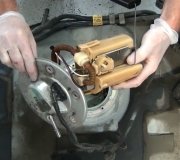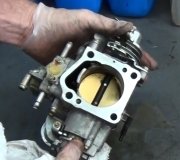Cars today are really complicated and it is impossible for owners to understand how the complicated systems work. Your mechanic has to balance explaining exactly what he did to fix a problem with simplifying it to make it understandable. The technical terms used to explain the problem accurately would send your head spinning and would leave you lost and confused. He knows that. Making it understandable means leaving out important details which often changes the meaning of what he said. Additionally, you can't help but fixate on the bad news which causes you to miss some information. That's why it's real common to hear things differently than the way they were said. If pressed, a good mechanic who has a little time to spare, will gladly elaborate or explain things in a different way until you understand the issue. A well-informed owner is easier for the repair staff to work with. Also remember that other than the very few bad apples you'll find in any profession, the mechanic is your partner, not your adversary. His goal is to repair your car and make you happy, not to fight with you.
That's my opinion piece on "I didn't really understand what mechanic was telling me".
Your engine is a real powerhouse in that little car and should have plenty of power. The comment about it acting up after it is warmed up suggests the possibility of it being related to the oxygen sensor in the exhaust system. The computer uses information from that sensor to fine tune fuel delivery AFTER the engine is up to normal temperature. Before that, it runs on just the other sensors' information.
It is almost unheard of to fix a running problem on a Chrysler product by replacing the fuel filter. They just don't give that much trouble unless they start to leak. Low fuel pressure can cause a problem when accelerating. The pressure regulator raises fuel pressure when the engine is under increased load, (hills, accelerating, etc). If your mechanic finds the pump can't develop enough pressure, the pump could be weak or he might suspect a defective regulator. Regulators usually give very little trouble on Chrysler products.
If this car has been sitting for a long time, the fuel may have become stale. New gas could solve the problem. The fuel system is not monitored by the engine computer. Other sensors that help determine engine performance are monitored by the engine computer. The computer will turn on the "Check Engine" light if it detects a reading outside of preset limits indicating a defective sensor. It is possible for a sensor to report an incorrect value that is within normal limits. The computer will believe the incorrect value and adjust fuel delivery accordingly. The result could be what you're feeling. Usually the sensor causing the problem will fail completely in a few days and will be easier to find. This is a common way for the MAP sensor to fail, and they did have a lot of trouble with them in the early 1990s. Replacement sensors where of a different design and gave very little trouble.
A leak in the fuel line could also cause this problem. It's occurring right now on my '88 Grand Caravan. Under anything more than half throttle, the pressure in the fuel system builds up enough to cause the fuel to leak past a loose hose clamp. Inadequate pressure causes insufficient fuel to spray from the injectors and the engine will stumble or sputter. Interesting thing though, this doesn't act up on my van until I've been driving about 20 minutes. I can't explain that. Originally I saw puddles under the gas tank where I parked but no longer. Can't explain that either. Guess I should tighten that clamp, huh?
This is going to be a problem best left to a professional. What will be of great help is if you can drop the car off just before the appointment so the engine is still warmed up. If it sits in their parking lot all day, he will have to drive it long enough to get the problem to occur so he can do some diagnosis. You'll be paying for that time. Any other clues you might notice should be mentioned too. You never know what might be helpful.
Caradiodoc
Saturday, December 12th, 2009 AT 12:43 AM


